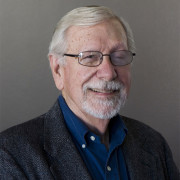Scientist who links emotion, memory wins psychology award
University of California-Irvine neurobiology and behavior research professor James McGaugh received the prize for discovering that stress hormones such as epinephrine and cortisol play a critical part in determining why we remember some things more vividly than others.
The hormones activate the brain’s emotional center, the amygdala, which in turn regulates other brain areas that process and consolidate memories – a sequence that explains why our emotional experiences are easier to recall, he found.
“His work has transformed the field,” said award director Woody Petry. “It has profound implications for helping us understand and treat memory disorders such as post-traumatic stress disorder.”
McGaugh began studying the link between emotion and memory in the 1960s, when he learned that giving stimulants to animals immediately after training helped them remember their exercises. Later, he learned that naturally occurring stress hormones had a similar memory-enhancing effect.
Recently, he has studied people with highly superior autobiographical memory to see if differences in their brain structure may account for the trait.
McGaugh founded UC-Irvine’s neurobiology and behavior department and its Center for the Neurobiology of Learning and Memory.
Five Grawemeyer Award winners are being named this week. The university presents the prizes annually for outstanding works in music composition, ideas improving world order, psychology and education and gives a religion prize jointly with Louisville Presbyterian Theological Seminary.
This year’s awards are $100,000 each.
About James McGaugh
James McGaugh’s seminal work on emotion and memory has been featured in popular television programs such as CBS’s “60 Minutes,” described in dozens of textbooks and cited some 31,000 times in more than 15,000 professional papers.
He joined the University of California-Irvine’s faculty in 1964. Over the years, he served as the university’s executive vice chancellor, academic affairs vice chancellor, biological sciences dean and department chair in addition to founding and directing its Center for the Neurobiology of Learning and Memory.
UC-Irvine named McGaugh Hall on its campus after him in 2001. The university also awarded him its UCI medal and established a neurobiology and behavior graduate research award of excellence in his name.
Previously, he had faculty posts in the departments of psychology at University of Oregon and San Jose State University after earning his doctorate in physiological psychology at University of California-Berkeley and his bachelor’s degree in psychology from San Jose State.
McGaugh has written or co-written more than 550 publications, including five textbooks and a general-interest book.
Among his many honors are the Association for Psychological Science’s William James Fellow Award, American Psychological Association’s Distinguished Science Award, American Philosophical Society’s Karl Lashley Prize in Neuroscience, Society of Experimental Psychologists’ Norman Anderson Lifetime Achievement Award, American Association for the Advancement of Science’s John McGovern Award and Western Psychological Association’s Lifetime Achievement Award.
A former president of the Association for Psychological Sciences, he is a member of the National Academy of Sciences, Society for Neuroscience, International Brain Research Organization, American College of Neuropsychopharmacology, Society of Experimental Psychologists and World Academy of Art and Science.
He also is a fellow of the American Academy of Arts and Sciences.
He has been a scientific consultant to many organizations, has served on many journal boards and was founding editor of Neurobiology of Learning and Memory and former editor of Behavioral Biology and Behavioral and Neural Biology journals.



